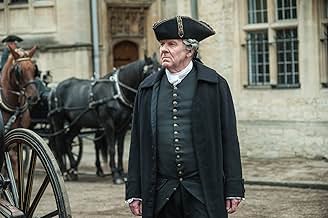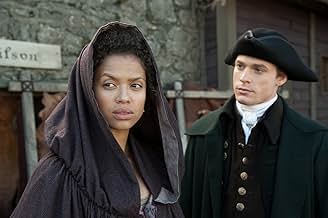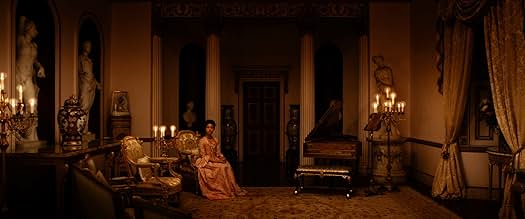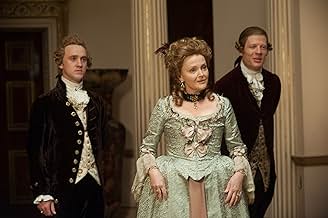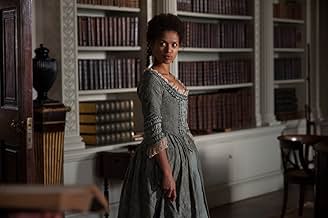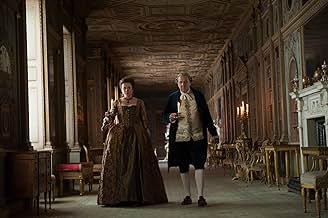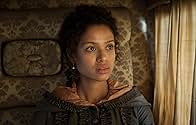The biracial daughter, Dido Elizabeth Belle (Gugu Mbatha-Raw), of Royal Navy Captain Sir John Lindsay (Matthew Goode) is raised by aristocratic Great-uncle Lord William Murray, 1st Earl of M... Read allThe biracial daughter, Dido Elizabeth Belle (Gugu Mbatha-Raw), of Royal Navy Captain Sir John Lindsay (Matthew Goode) is raised by aristocratic Great-uncle Lord William Murray, 1st Earl of Mansfield (Tom Wilkinson) in 18th century England.The biracial daughter, Dido Elizabeth Belle (Gugu Mbatha-Raw), of Royal Navy Captain Sir John Lindsay (Matthew Goode) is raised by aristocratic Great-uncle Lord William Murray, 1st Earl of Mansfield (Tom Wilkinson) in 18th century England.
- Awards
- 13 wins & 32 nominations total
- Director
- Writer
- All cast & crew
- Production, box office & more at IMDbPro
Featured reviews
As the film begins, although she is born illegitimate, Dido's father (Matthew Goode, Stoker) gives her over into the care of his great-uncle, William Murray, the first Earl of Mansfield (Tom Wilkinson), who acts as the Lord Chief Justice of the British courts. As she grows into a young woman, Dido's life at the palatial estate of Kenwood is full of mixed blessings. While her uncle and aunt (Emily Watson, Breaking the Waves) treat her as if she were their own—they raise her alongside their other niece, Elizabeth Murray (Sarah Gadon, A Dangerous Method)—social conventions of eighteenth century society are immovable; no matter how much they love her, Dido feels the sting of being forced to eat with the servants, when company comes calling.
The greatness of the film comes in its intricate plotting, and in the parallels drawn between gender and race. Author Jane Austen dealt with the position of women in English society through the use of dry humor—though the rage at a young woman being forced into marriage in order to secure a safe future was always very much present. In Belle however, there is no satire to soften the blow. As Elizabeth comes out, venturing to London in search of a husband, she points out to Belle the inherent unfairness of a system that allows women to be treated as male property. Dido doesn't necessarily have the problem of a search for a husband, as the inheritance of her father's fortune ensures that she is financially secure; but for a radiant young woman in the prime of her life, her uncle's insistence on keeping her out of sight understandably rankles her.
Matters are complicated by the arrival of John Davinier (Sam Reid), the son of a local clergyman. Ambitious and wide-eyed, John wants to try to rise in station, training with Lord Mansfied to become a lawyer. His outspoken, radically abolitionist views on a notorious legal case Lord Mansfield is trying annoy the Lord considerably; but he rouses all the passionate feeling in Dido that she has been forced for so long to suppress.
As Lord Mansfield, Wilkinson (Batman Begins, Michael Clayton) plays the exasperated father figure with the correct touches of humor and warmth. As a judge, he projects the inner conflicts of a man with the weight of the entire economic system on his shoulders; you can see him try to deflect from the strong-arming of local politicians, who want to ensure that the presence of the "mulatto" in his house will not affect his ruling on the case. As Elizabeth, Gadon takes what could have been a very stereotypical role of the flighty, romantic English girl, and brings a deep sense of hurt to it. Having been left with her uncle after her new stepmother successfully wrote her out of her father's will, Elizabeth's cheery exterior hides an emotionally hurt young girl.
And finally, there is Mbatha-Raw. As Dido, the engine that drives the film, you may deeply feel her two-fold frustration as a woman, and as a person of color. You will be carried away by her passion—her belief that things should not remain the same. On a more general level, the camera absolutely adores her. She moves and projects with a vitality and ease that forces one to stop at several points. Her characterization and her performance are so accomplished, that her independent-minded heroine could stand toe-to-toe with the multiple incarnations of Jane Austen's Elizabeth Bennett. If Belle is any indication, and if there is any fairness in this world, there should be more great things to come from her.
-Nick Kostopoulos - See more at: http://www.mediumraretv.org
This film would have been OK as a total fiction but given that it was based on a true story, I found it fascinating. Set in England in the late 1700's, it shows the impact of the slave trade on society. The patriarch of the family is a justice of the High Court of England and takes on an important case regarding a slave trading ship while confronting the reality of limitations faced by his mulatto niece. It shows that when someone becomes part of your family, and you love that person, it changes your perspective on cultural norms. This film has prompted me to look into the history of the actual legal case involved.
The film also showed the similarities between his white and mulatto nieces: as women both had a price on their heads and suffered due to their "place" in that society beneath men... This film showed that while much has changed, many attitudes have not changed in 300 years... The two brothers who court the nieces could have come from any current film if they just updated their styles of clothes, hair, and accents.
The fact that the movie was based on a true story just made it even more impactful. Dido Elizabeth Belle is left in England by her loving Admiral father, to be raised by her aristocratic aunt and uncle - at a time in history when wealth and social standing could not overshadow the fact that she was a mixed race, illegitimate child. Belle's story of trying to figure out her place in the world and in her family unravels beautifully alongside a closer and deeper look at the racism and sexism plaguing the British society at the time. Add a dash of romance and the result is a beautiful film definitely worth watching.
- A love story and the value of being honest to yourself is what Belle is about. This movie transports you to the 1700s England. Based on the true story of Dido Elizabeth Belle "Belle", this tale is about a young mulato girl named Belle that is brought into her father's house and caretaker of her great-uncle Lord Mansfield a honorable Chief Judge and wife. Belle has all the rights and privileges of upper society but her face reflects her slave mother and the prevailing social prejudice keeps her from being totally accepted into the formal social circles. At the same time, she befriends her cousin, who she considers a sister and is also given residence to this estate after her mother dies and her father abandons her. This story is beautifully layered with the issues of equality and slavery but is not preachy. It merely shows how the matters of the heart can't be prevented by the color of your skin. This coming of age story is masterfully told. I saw this film as part of the Atlanta Film Festival.
Did you know
- TriviaIn real life, Lady Elizabeth Murray married first to George Finch-Hatton, 10th Earl of Winchilsea. Their great-grandson was Denys Finch Hatton, who was played by Robert Redford in Out of Africa (1985).
- GoofsEngagement rings were not used in the late 1700s. They didn't emerge until the 1920s.
- Quotes
Dido Elizabeth Belle: My greatest misfortune would be to marry into a family who would carry me as their shame.
- ConnectionsFeatured in Belle: The Story (2014)
- SoundtracksPiano Suite in G Minor, HWV 439, Allemande
Composed by George Frideric Handel
- How long is Belle?Powered by Alexa
Details
- Release date
- Country of origin
- Official sites
- Languages
- Also known as
- Белль
- Filming locations
- Production companies
- See more company credits at IMDbPro
Box office
- Budget
- $10,900,000 (estimated)
- Gross US & Canada
- $10,726,630
- Opening weekend US & Canada
- $106,578
- May 4, 2014
- Gross worldwide
- $16,607,575
- Runtime
- 1h 40m(100 min)
- Color
- Sound mix
- Aspect ratio
- 2.35 : 1







